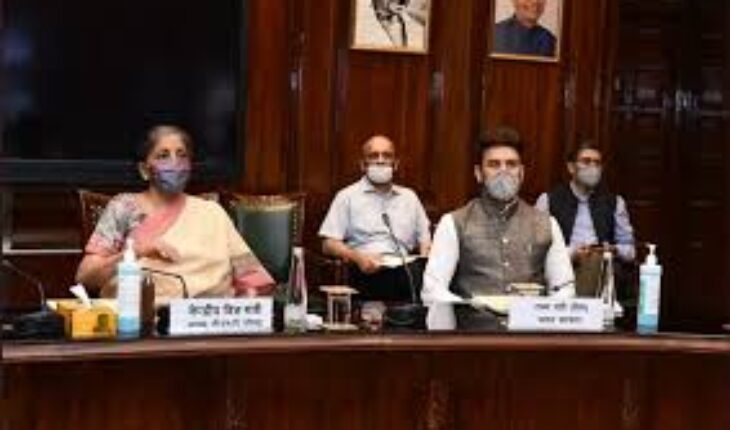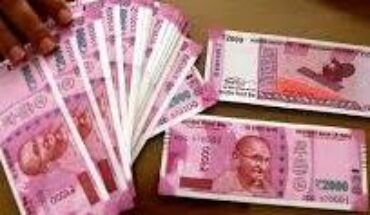NEW DELHI: The two borrowing options to meet the GST Compensation requirement for 2020-21 consequent to the discussions in the 41stmeeting of the GST Council held on 27th August, 2020 has been communicated to States,as per the document attached with this press note, to communicate their preference within seven working days. A meeting of State Finance Secretaries with the Union Finance Secretary and Secretary (Expenditure) is scheduled to be held on 1st September, 2020 for clarifying issues, if any.
GST compensation options,there are two options mentioned at the GST Council meeting on 27thAugust2020, with a view to enabling the States to give their preference and views thereon within seven working days.Certain background information as furnished in the Council meeting is appended in Annex 1.After the scheme is finalized, the states can chose either Option 1 or Option 2 and accordingly their compensation, borrowing , repayment etc will be dealt as per their individual choice. The options are applicable only for the shortfall occurring in the current financial year.
Option 1:
* The shortfall arising out of GST implementation(calculated at Rs. 97,000 croresapproximately) will be borrowed by States through issue of debt under a Special Window coordinated by the Ministry of Finance.
*It will be the endeavour to ensure steady flow of resources similar to the flow under GST compensation on a bi-monthly basis.
* The GOI will endeavour to keep the cost at or close to the G-sec yield, and in the event of the cost being higher, will bear the margin between G-secs and average of State Development Loan yields up to 0.5% (50basis points) through a subsidy.
*A special borrowing permission will be given by the GOI under Article 293 for this amount, over and above any other borrowing ceilings eligible under any other normal or special permissionnotified by Department of Expenditure.
*In respect of Union Territories(including National Capital Territory), suitable arrangements to ensure flow of resources under the Special Window to them would be made by the Government of India
*The interest on the borrowing under the Special Windowwill be paid from the Cess as and when it arises until the end of the transition period. After the transition period, principaland interest will also be paid from proceeds of the Cess, by extending the Cess beyond the transition period for such period as may be required.The State will not be required to service the debt or to repay it from any other source.
*States will also be given permission to borrow the final instalmentof 0.5% (originally intended as a bonus for completing at least three of the four specified reforms) allowed in para 4 of the Department of Expenditure’s OM F.No. 40(06)/PF-S/2017-18dated 17-5-20 (hereinafter referred to as DOE OM) even without meeting the pre-conditions.This will enable borrowing of approximately Rs. 1 lakh croresin aggregate.
*The first instalmentof 0.5% unconditional borrowing permission granted vide para 4 of the DOE OM remains unaffected. The reform-linked tranches specified in paras 5 to 8 of that OM also remain unaffected.
*In modification of para 9of the DOE OM, States will be able to carry forward unutilisedextra borrowing ceilingsgiven under that OMto the next financial year; the instalments under para 4 (0.5 unconditional + another 0.5 as per para VII above)can be carried forward unconditionally; the reform-linked portions can be carried forwardif theStatesmeet the reform criteria within the dates already prescribed for this year.
*Theborrowing under the Special Window will not be treated as debt of the Statefor any norms which may be prescribed by the Finance Commission etc.
*The Compensation Cess will be continued after the transition period until such time as allarrears of compensation for the transition period are paid to the States. The first charge on the Compensation Cess each year would be the interest payable; the second charge would be the principal repayment. The remaining arrears of compensation accrued during the transition period would be paid after theinterest and principalare paid.
Option 2
*The entire shortfall of Rs235,000 crores (including the Covid-impact portion) maybe borrowed by States through issue of market debt.The GOI will issue an OM committing to repayment of principal on such debt from Cess proceeds as per para IV below.
* Appropriateenhanced special borrowing permission will be given by the GOI under Article 293 based onthe following methodology, in modification of scheme notified earlier under the DOE OM:
A) Each state’s borrowing limits for the year will be based on the following calculation:Basic eligibility (3 % of GSDP) + Amount allowedfor shortfall as per Item I above of Option 2+ up to 1% of GSDP (reform-linkedas per paras 5 to 8 of DOE OM)
or
Basic eligibility (3% of GSDP) + 1% of GSDP + up to 1% of GSDP (reform-linked as per paras 5 to8 of DOE OM)whichever is higher.
B) The additional unconditional borrowing limit of 0.5% and the final (bonus) tranche of 0.5% under para 4 ofthe DOE OM will not be separately available, being subsumed under the calculation above.
C) States will remain eligible for the reform-linked tranches of borrowing under paras 5 to 8 of the DOE OM this yearbut shall not be eligible to carry them forward.The maximum amount which can be availed under that OM shall stand reduced to 1% of GSDP instead of 2%of GSDP.
* The interest shallbe paid by the Statesfrom their resources.
* The principal on the amount under Item I above will, after the transition period,be paid from proceeds of the Cess.The Stateswill not be required to repay the principalfrom any other source.
*To the extent of the shortfall arising due to implementation of GST (i.e. Rs. 97,000 crores approximately in aggregate) the borrowing will not be treated as debt of the Statefor any norms which may be prescribed by the Finance Commission etc.
* The Compensation Cess will be continued after the transition period until such time as allarrears of compensation for the transitionperiod are paid to the states. The first charge on the future Cess would be the principal repayment. The remaining arrears of compensation accrued during the transition period would be paid after the principal is paid.





